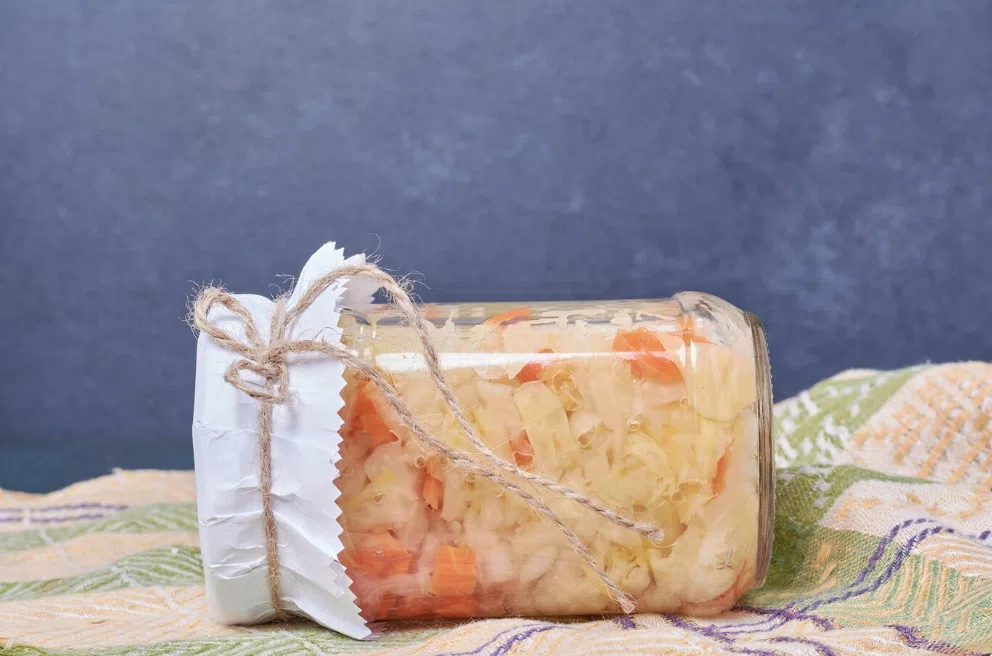🌿 How Acidic Is Sauerkraut for Teeth?

Sauerkraut is a well-liked pickled product that is famous for its sour taste and various health benefits. Due to the fact that it is rich in fermented cabbage, it is healthy because of the good bacteria and the natural vitamin content that provides benefits to the stomach and immune system. However, the fact that sauerkraut is sour is an outcome of the bacteria that it has during the fermentation process, and consuming acidic foods like it frequently can lead to an increased accumulation of dental plaques, which is a negative impact on your dental health.
🔬 What Is the Major Source of Acid in Sauerkraut?
Among the acids, the main one that is related to sauerkraut’s acidity is the lactic acid which comes from the conversion of sugars in cabbage to lactic acid caused by the present bacteria. The full range of this concentration is a pH ranging from 3.0 to 3.5, to be specific, which makes sauerkraut quite sour. The acids may indeed be good for the health of this food; still, they might contribute to other phenomena like demineralization and thus caries on the teeth if inhaled constantly.
🦷 What Effect Does Sauerkraut Have on Your Teeth
Enamel Erosion
Lactic acid is an essential factor in the process of enamel erosion through sauerkraut that can deteriorately affect teeth. Regular exposure to acid can lead to the general destabilization of enamel, which makes your teeth more prone to diseases and weakens their resistance to the surrounding environment.
Sore Teeth
Enamel loss can also contribute to teeth sensitivity, which can, in turn, lead to an extremely painful set of teeth that do not react well to temperature and may eventually deteriorate. This variety is known as painful teeth.
Discoloration
So, your problems are not over, and in fact, they may get worse, as acid elicits a gradual diminishment of your enamel that will, in turn, be vulnerable to discoloring food. At a slower pace, but it could still cause a change in the color of the teeth, which in the end will result in the loss of their original sheen.
Cavities
There does exist a possibility of the enamel getting damaged by the acids present in traditional sauerkraut, that too if this traditional dish has not been supplemented with a high level of sugar. At the same time, bacteria, which form on the surface of the teeth, find the condition to be favorable and, thereby, can cause cavities in our teeth Additionally, the consumption of sauerkraut with other acidic foods will worsen the situation as it will speed up tooth decay.
Tips to Protect Your Teeth While Eating Sauerkraut
- Rinse your mouth with water after eating sauerkraut to remove any remaining acid from your teeth.
- Consume sauerkraut along with foods like cheese, or yogurt with an alkaline nature to balance the pH and protect your teeth.
- Remember to store your toothbrush properly after eating sauerkraut. The acidic nature of sauerkraut can weaken the enamel and brushing your teeth right away will only cause further damage. You should wait at least 30 minutes before brushing.
- Use sauerkraut with limit because excess consumption may lead to the wearing of the enamel of your teeth, predisposing you to the risk of cavities.
🌿 Final Thoughts from Lema Dental Clinic
Although sauerkraut is very low in sugar and can be a healthy and tasty part of one’s diet, it can still be a very big danger to the teeth and the usage of this food must be limited. By taking such measures as rinsing your mouth every time after eating sauerkraut, developing the habit of matching it with your teeth-friendly snacks, and justative approaches to brushing, you may still make the habit of including sauerkraut in your diet and also protect your smile.




